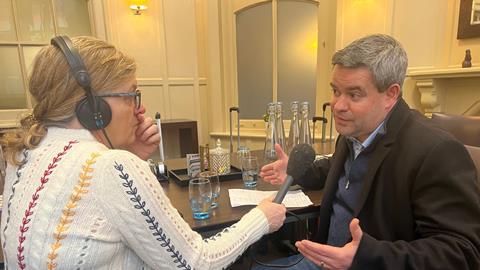CEO of Belgian fresh produce co-op advises British growers to form more producer organisations to help them command higher prices with retailers
UK growers should group together and set up more producer organisations and cooperatives to give themselves greater bargaining power in the face of intense price pressure from their retail customers.
This was the message from Philippe Appeltans, the CEO of Belgian fruit and vegetable cooperative BelOrta, amid major shortages in a range of salad vegetables and other produce at UK supermarkets.
A group of BelOrta’s growers were taken on a tour of UK retailers and farms by Fruitnet Media International managing director Chris White on 2-3 March, to explore opportunities to boost exports to Britain post-Brexit.
The cooperative has around 1,000 grower members and exports a range of fruits and vegetables to the UK and across Europe. Products include tomatoes, cucumbers, peppers, pears and berries, as well as leafy greens, various vegetables, herbs and mushrooms.
Speaking on BBC Radio 4’s Farming Today programme, Appeltans emphasised the advantages of POs like his own in giving growers greater bargaining power, a stronger position in the value chain, and reliable supply thanks to the larger quantities of produce they can offer customers.
“Growers can focus on growing top-quality produce, and BelOrta takes care of the marketing, sales, and food safety regulations,” he said. “This is a win-win for our customers.
“If our people do the quality checks, there’s no need that they [importers] double the quality checks, and in the end, there will be more money available for the growers.
“So, my advice to UK growers is please set up producer organisations, come together, and then you have some power. Also, you have the resources to innovate on new varieties, packaging, marketing concepts, and so on. You need a certain scale [for this], that’s for sure.”
As it stands, the UK has considerably fewer POs than its European neighbours Belgium and the Netherlands. And following the UK’s departure from the European Union, Britain’s existing POs will lose funding under the EU’s existing Fruit and Vegetables Aid Scheme in 2025.
In its recently published ‘UK horticulture growth strategy’, the NFU stressed it is “critical” that Britain’s replacement scheme is finalised as soon as possible, with no further delays in its development.
NFU horticulture chair Martin Emmett said Appeltans’ comments were “fair” but that “we have to look at it sector by sector and recognise the level of consolidation and cooperative activity already in place in the UK”.
He argued that some UK horticulture sectors like soft fruit are possibly already at the “maximum point of PO development”, while other such as tomatoes and peppers are heavily consolidated.
The tomato sector is dominated by major suppliers such as APS Group and Thanet Earth, so there are a limited number of players that may choose to join forces, he pointed out.
Emmett sees greater opportunities in field vegetables and ornamentals, and said he wants to work with government to make the development of POs more feasible in these sectors.
As well as offering advantages in terms of marketing and bargaining power, POs give growers greater collective strength to finance advances in technology, automation and other areas, Emmett added.




